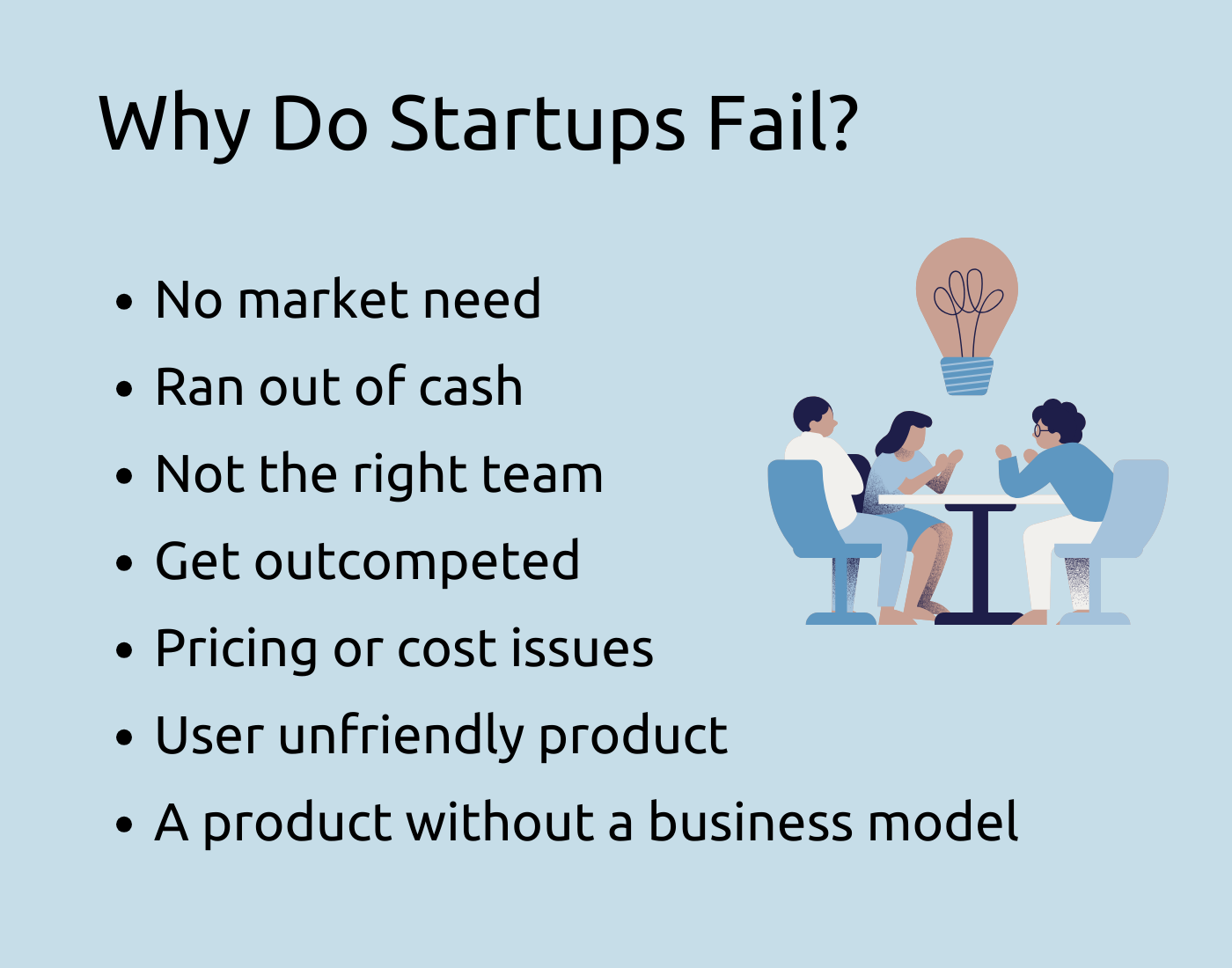Cryptocurrencies and blockchain technology are fundamentally altering our approach to interaction, transactions, and investment. These innovative systems have the potential to revolutionize a multitude of industries. Let’s delve deeper into this subject by exploring the top 10 essential steps on how to start a crypto startup successfully.
While the concept of creating a cryptocurrency project may seem straightforward initially, the journey towards scalability and successful promotion is fraught with challenges. Understanding the needs of the crypto market and carving out a distinct niche are critical for starting your crypto startup. Whether it’s starting a crypto mining startup or delving into NFT trading platforms, identifying your unique position is paramount.
How to Start a Crypto Startup?
1. The Importance of Market Research
Market research is the foundation, and CB Insights statistics show that startup failures typically result from its lack.
This first step requires a thorough dive into the changing cryptocurrency world. You must identify trends, opportunities, and difficulties in its complexity.
Market research needs active participation and analysis. It entails analyzing rivals and user needs in addition to evaluating the landscape. Importantly, it involves recognizing market gaps that foster innovation.
Understanding user needs requires empathizing with their bitcoin pain points. Addressing these pain issues makes your company stand out in the market.
2. Crafting Your Startup’s Identity
Defining the identity of your startup involves painting a vivid picture that encapsulates its mission, values, and unique selling points (USPs), distinguishing it within the competitive landscape. Below, I outline three key aspects essential for shaping your startup’s identity:
Choosing between a New or Existing Blockchain Infrastructure
At the inception stage, a critical decision awaits: whether to embark on the creation of a blockchain from scratch or leverage an existing one. Crafting a new blockchain offers unparalleled customization opportunities but demands significant development resources and time investment. Conversely, opting to fork an existing blockchain can expedite your startup’s journey, albeit with potential constraints on adaptability.
Deciding between public and private blockchain networks
As you navigate the path ahead, you’ll encounter the crossroads of choosing between a public or private blockchain. A public blockchain beckons with its inherent transparency and decentralization, making it an attractive option for projects emphasizing openness and inclusivity. Conversely, a private blockchain provides enhanced control and privacy, catering to specific use cases that prioritize confidentiality.
Selecting the Optimal Consensus Mechanism
The consensus mechanism serves as the lifeblood of your blockchain infrastructure, demanding meticulous deliberation. With a spectrum of options available, ranging from the energy-intensive proof of work (PoW) to the more eco-friendly proof of stake (PoS), the agile delegated proof of stake (DPoS), and the trust-based proof of authority (PoA), your choice must align closely with your blockchain’s objectives and intended applications.
3. Platform Selection: A Strategic Imperative
Usability, scalability, security, and community support ecosystem strength must be considered while choosing a platform. Ethereum, Binance Smart Chain, and Polkadot have leading development tools, large user bases, and dynamic ecosystems.
Ethereum, Binance Smart Chain, and Polkadot are crypto leaders because of their smart contract capabilities, low transaction costs, and interoperability. These platforms have substantial user bases, development resources, and healthy ecosystems.
Choosing one of these top platforms helps speed development and boost user adoption. Solana, Cardano, and Tron are all worth considering for their unique features and rising popularity. Your platform choice will greatly affect development and user retention.
- Recommended broker
Our recommendation:
Invest with eToro
4. Form your dream team
The success trajectory of your startup is intricately linked to the collective expertise and skills of your team. To carve out one of the most formidable crypto projects, it’s imperative to recruit talents spanning proficient developers, seasoned blockchain experts, and astute legal advisors.
Think about collaborating with specialized development companies known for their excellence, such as Peiko, who have received praise and recognition from prestigious review sites like Clutch. With Peiko’s unparalleled technical prowess, robust security protocols, and profound grasp of regulatory compliance, your project’s journey towards triumph is poised for acceleration.
5. Development
Starting a crypto startup requires several development phases to lay the groundwork. These phases usually include:
- Initial infrastructure setup includes creating development environments and installing important tools.
- Once the infrastructure is in place, allowing team members and stakeholders access provides smooth communication and progress monitoring.
- Building a Blockchain: Your project relies on blockchain technology for decentralized transactions and data management.
- Creating Smart Contracts: Blockchain-based smart contracts automate and enforce conditions without middlemen.
- User-friendly apps that connect with your blockchain network improve end-user accessibility and usefulness.
Each level requires rigorous attention to detail and technological competence.
6. MVP: How to Start the Crypto Startup Journey
The MVP is a crucial step in starting a crypto startup. Your startup’s fundamental version has just the key functionality needed to provide demonstrable value to users.
Your MVP represents your crypto vision and innovation. Engage with early adopters who want to experience your MVP at this crucial moment. Early adopters see your project’s potential.
Honor their experiences and main concerns, and accept their comments. This validation feedback loop fine-tunes your startup’s instrument. Refine your MVP based on this input to improve usability, functionality, and the user experience.
7. Future-Proofing Your Startup
Strategic planning is necessary for scalability once the MVP establishes your business. Your cryptocurrency or blockchain project must manage rising user demand, transaction volumes, and network growth.
Scalability planning includes codebase optimization and consensus mechanism implementation. Layer-2 solutions such as sidechains, state channels, plasma, and rollups must be investigated. These solutions are tailored to blockchain ecosystem scalability and performance issues.
You may learn more about layer-2 solutions by watching videos. The key objective is to strengthen your system so it can handle future development while maintaining security and performance.
8. Funding avenues
Any crypto startup needs funding to succeed. It’s crucial to search widely for financial sources.
Venture capital companies like Andreessen Horowitz (a16z), angel investors like Roger Ver and Barry Silbert, and cryptocurrency crowdfunding sites like CoinList and SeedInvest are options.
Along with financial backing, these sources and people provide vital insights and experience for your crypto startup. Venture capital companies may provide crypto business accelerator programs like a16z’s Crypto Business School, mentoring and educating potential company builders.
Despite the “crypto winter,” 2022 was a landmark year for cryptocurrency venture capital investment, with $26.2 billion invested in 2,541 transactions, according to Pitchbook.
According to Coinstack, $1.4 billion was invested in the industry in the first two months of 2023. This large number shows how the bitcoin business is developing and how institutional actors are involved.
9. Marketing Strategy
A solid marketing plan guides your firm in the competitive crypto industry. Many blockchain projects have succeeded entirely because of their marketing.
Start by identifying your audience and tailoring your message. A multifaceted marketing strategy should include social media outreach, content marketing, community participation, and strategic relationships with influencers or other blockchain projects.
To boost brand awareness and reputation, conduct instructive webinars, AMAs, and industry events. A strong marketing approach draws users, investors, and trust into your project, laying the groundwork for long-term success. 10. Take advantage of chances and network.
Networking is key to crypto success. Join crypto communities, attend blockchain conferences, discuss your crypto company ideas, and utilize forums and social media. Building strong relationships with industry experts, developers, investors, and partners is crucial.
Each of these 10 stages is crucial to starting your crypto startup. Consider these, and your crypto startup will succeed in the dynamic cryptocurrency environment.
Conclusion: How to Start a Crypto Startup
Starting a crypto startup may seem daunting, but for those with the courage to take the leap, the opportunities are boundless. Beyond mere success, there lies the potential to shape the future of finance and technology.
The realm of crypto startups beckons those with innovation and determination. Embrace the challenge, and may your journey in the world of crypto startups be as fulfilling as it is transformative.





